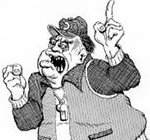11) Most compound nouns form the plural by pluralizing the fundamental part of the word - governors general, trade unions, spelling matches
12) When a compound noun is made up of a noun and some form of preposition or phrase, the noun is usually pluralized - brothers-in-law, passers-by, runners-up
13) When compounds are written as one word, their plurals are formed according to the usual rules - businessmen, stockholders, bylaws
14) Nouns that retain their foreign endings form their plurals as follows: a changes to ae, us changes to i, um changes to a, on changes to a, is changes to es
minutia-minutiae
vertebra-vertabrae
alumnus-alumni
cactus-cacti
addendum-addenda
bacterium-bacteria
criterion-criteria
analysis-analyses
16) Plurals of letters, signs, symbols, figures, and abbreviations used as nouns are formed by adding s or an apostrophe and s. The omission of the apostrophe is gaining ground - 1990s, GICs, GRSPs
17) Groups of animals have their own nouns for the collective. For example:
a school of fish
a sounder of wild boar
a pride of lions
a murder of crows
a clowder of cats
a paddling of ducks (in water)
a team of ducks (in flight)
a nide of pheasants
a covey of quail
a skein of geese (in flight)
a skulk of foxes
And there are other possibilities that show promise but have not yet become common usage:
a tragedy of lawyers
a clutch of mechanics
a drove of taxi cabs
an imelda of shoes
a mass of priests
a stoppit of parents
a brace of orthodontists
an interference of mothers-in-law
a ledger of accountants
a portfolio of money managers
Tuesday, June 26, 2007
Subscribe to:
Post Comments (Atom)







No comments:
Post a Comment